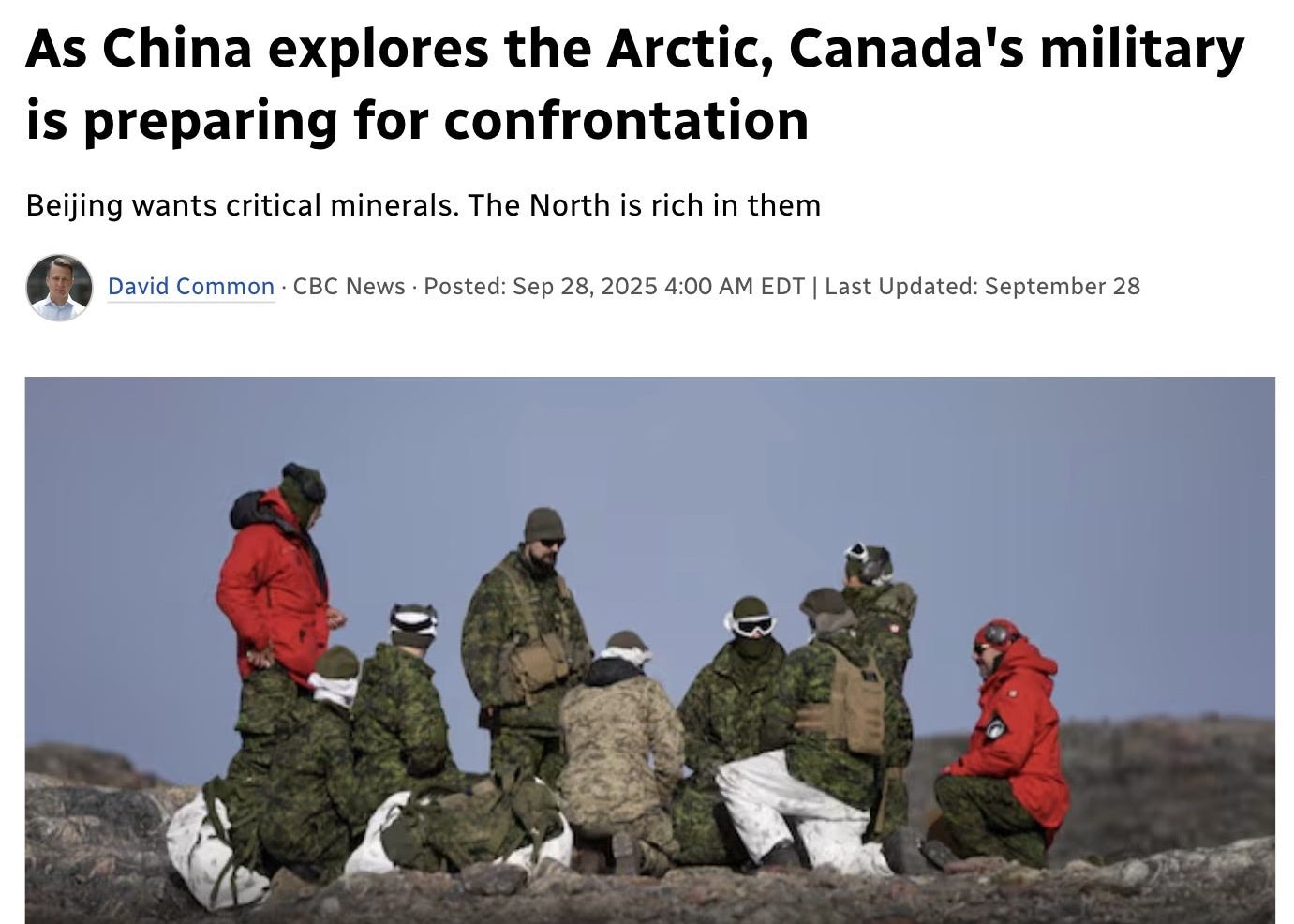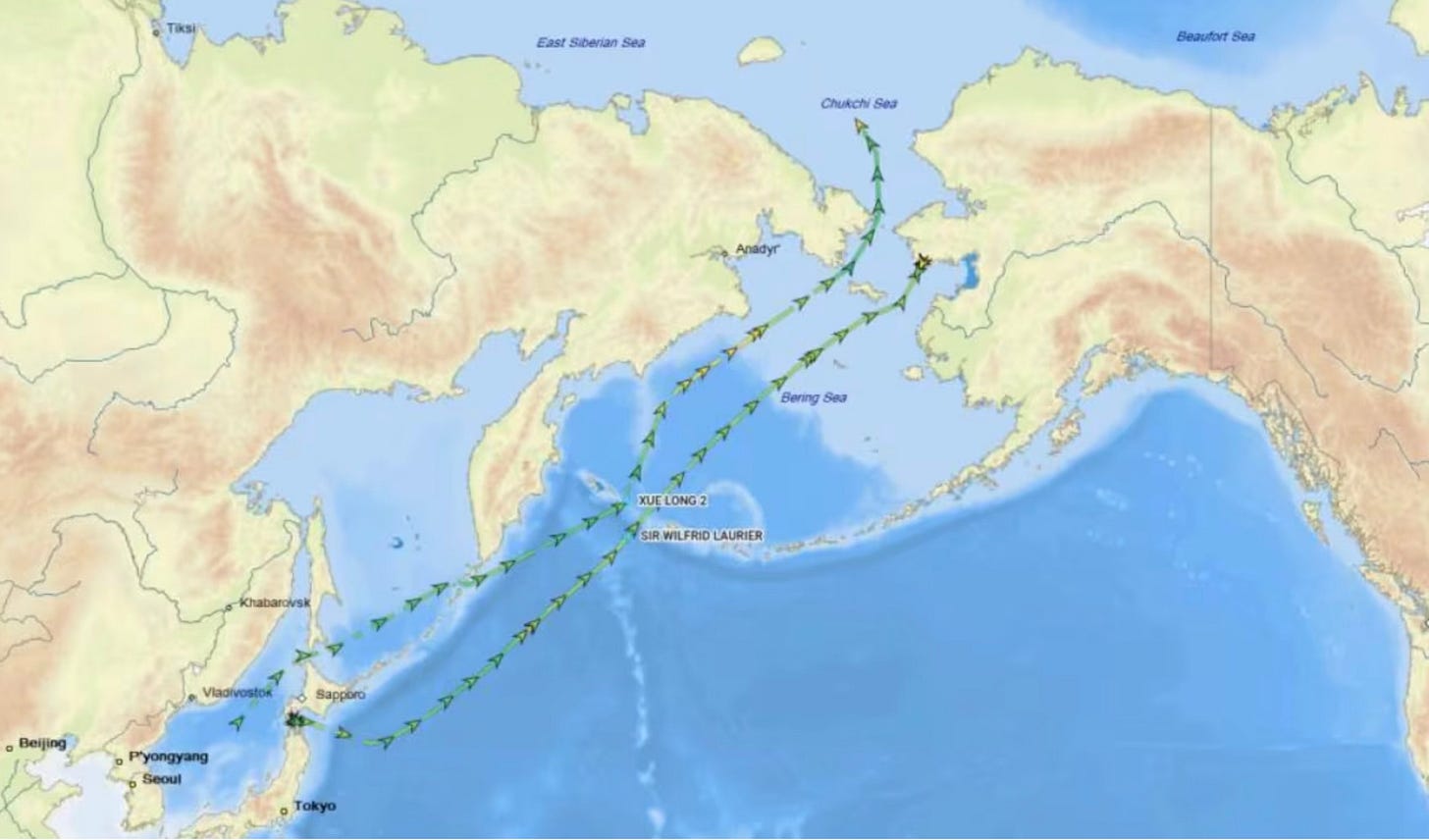CBC’s Arctic Reporting Reads More Like Military PR Than Journalism
Unbalanced reporting relating to China and Russia makes rational foreign policy discussion in public sphere nearly impossible.
Sovereignty in the Arctic—including sovereignty over the Northwest Passage—is one of Canada’s most important foreign policy questions. It shapes debates over defence, military expansion, natural resources, Indigenous rights, climate change, and Canada’s role in the world. Media reporting on these issues should help Canadians understand the stakes and think critically about our options.
Unfortunately, CBC’s recent article by David Common does the opposite. Rather than informing readers, it almost reads like something produced by the public affairs division at the Department of National Defence. It amplifies government talking points, paints China and Russia as looming threats, and leaves out critical context that Canadians need in order to make sense of the situation. The result is a lopsided narrative that distorts rather than informs.
Common begins by noting that “CBC News had exclusive access” to a military exercise in Canada’s north—meaning the reporting was effectively embedded with the armed forces, already a red flag for objectivity.
He explains that “the annual exercise is known as Operation Nanook,” which “took on particular significance this year with a collision of geopolitical changes: China’s growing ambition in the Arctic, Prime Minister Mark Carney’s plans to substantially increase the capabilities of the military and the newly recognized value of minerals in the North.”
Somehow, in listing these “geopolitical changes,” he manages to omit any mention of the United States. Yet unlike China, the U.S. has actually threatened to annex Canada, with an eye toward our critical minerals. Even former Prime Minister Justin Trudeau believed President Donald Trump’s annexation talk was serious—at a conference in Toronto in February, Trudeau was quoted as saying:
They’re very aware of our resources, of what we have, and they very much want to be able to benefit from those. But Mr. Trump has it in mind that one of the easiest ways of doing that is absorbing our country, and it is a real thing.
The omission of this crucial context by Common is staggering. In its place, he reiterates that “Canada’s traditional adversaries have shown growing interest in the North’s rich deposits of critical minerals.”
But is it only our “traditional adversaries” who have an interest in our minerals? The framing here once again ignores the explicitly stated U.S. threat to Canada’s sovereignty while toeing the official line about Russia and China.
While some might be tempted to dismiss Trump’s threats as harmless trolling, can we really let our guard down? Not only has Trump deployed National Guard soldiers to occupy U.S. cities, he has also mused about using America’s own cities as training grounds for the military. Given this, is it so far-fetched to imagine a scenario in which the U.S. flexes its formidable military might to gain control of Canadian resources?
At the very least, any serious reporter should mention the oft-repeated threats to Canadian sovereignty by an increasingly unhinged president of the world’s most powerful country in an article about Canadian Arctic sovereignty.
Common also explains that “China and Russia are known to use ‘shadow’ or ‘ghost’ vessels, which appear to be merchant or other inoffensive vessels, but are actually used for espionage or other nefarious activities.” He quotes military analyst Rob Huebert saying these “are not warships per se, but they are capable of taking all sorts of ... information that of course then can ultimately be utilized by warships in the future.” Common gives the example of one such “dual purpose” vessel, the Chinese Xue Long 2, which this summer “returned to Arctic waters for the second year in a row,” insinuating the vessel is some kind of threat to Canada’s sovereignty in the north.
Yet, according to the CBC’s own July 2025 reporting on the Xue Long 2’s voyage to the Arctic, the Chinese vessel was nowhere near Canada. In fact, it was a Canadian spy plane and coast guard ship that tracked the Xue Long 2 from Japan to the Bering Strait—an area well away from Canadian waters. At no point did the Chinese vessel come close to Canada’s territorial waters, much less attempt to traverse the Northwest Passage.
Not only does Common make this problematic insinuation about the Xue Long 2, he omits another crucial piece of context: Canadian warships themselves have sailed through the Taiwan Strait—waters China claims as its own, much like Canada claims the Northwest Passage for itself. Earlier this year, in February, HMCS Ottawa did exactly that, prompting China’s military to say the actions “deliberately stir up trouble and undermine peace and stability across the Taiwan Strait.”
To be sure, Chinese ships haven’t done the equivalent to Canada by navigating the Northwest Passage. But the United States has. In 1985, the USCGC Polar Sea, an American Coast Guard vessel, entered the Northwest Passage without Canada’s approval, sparking a major diplomatic controversy. Although Canada and the U.S. eventually reached an arrangement over future coast guard voyages, Washington has never recognized Canada’s sovereignty over the passage. As Harvard’s Kennedy School puts it:
The United States has taken the position that it is an international strait, through which foreign vessels can transit freely without Canadian consent.
Russia’s position, in contrast, has historically been far more favourable to Canada than Washington’s. Yet Canadian media consistently casts Russia as an Arctic bogeyman. International Affairs scholars David Carment and Dani Belo, writing for the NATO Association of Canada, made the following observation about Canada’s relations with Russia during the Stephen Harper era:
Perhaps because of the media’s portrayal of Russia as a threat to Canada’s Arctic, the Harper government ignored the fact that Russia was the only Arctic state sympathetic to Canada’s characterization of the Northwest Passage and was, like Canada, unenthusiastic about expanding Arctic Council membership to non-Arctic states. Indeed, Russia acted more as a ‘team player’ in the Arctic than the United States.
This is the deeper failure of Common’s piece. It isn’t just about leaving out Trump’s annexation threats or ignoring the U.S. refusal to recognize Canada’s claim over the Northwest Passage. It’s about the way Canadian media casts China and Russia as villains while giving the U.S. a pass—even as its president explicitly and repeatedly threatens our sovereignty.
That imbalance in reporting makes rational foreign policy discussion nearly impossible. The public deserves journalism that informs. CBC could have helped Canadians understand the complexities. Instead, it offered a cartoonish story of “good guys vs. bad guys,” obscuring the far more uncomfortable reality: the greatest threat to Canada’s Arctic sovereignty may not be in Beijing or Moscow, but in Washington.





The well written article exposes, convincingly, the biased reporting of the developing dynamics of the Arctic frontier as a result of climate change.The journalist is entitled to his views/preferences but certainly not to the facts; this area is far from the Canadian mainstream consciousness and an objective reporting would be the least that a responsible journalist ought to do as a service to the Canadian public. Thank you.